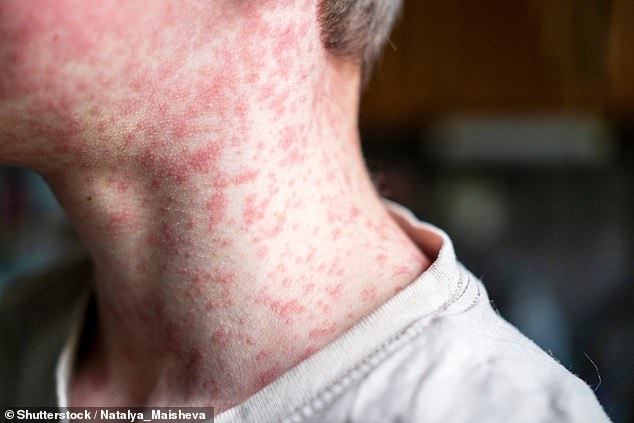[ad_1]
Britons have been urged to get vaccinated against lethal measles as experts warn of an expected wave in the coming weeks.
In some parts of England cases of the potentially deadly virus are already approaching those seen in the whole of 2024, which was the worst outbreak in over decade.
For example, in Bristol 47 cases have been recorded so far in 2025, compared to 53 for the whole of last year.
Now, officials from the UK Health Security Agency (UKHSA) warn the situation could get worse as British families head to Europe for their summer holidays.
Measles cases on the continent have reached their highest level in 25 years, and there are fears unvaccinated Britons could catch the bug overseas and then spread it upon returning home.
In a new alert, UKHSA said more parents failing to get their children the measles vaccine is leaving England at greater risk of outbreaks of the disease with thousands now unprotected.
Officials urged families to check they have had both shots of the MMR jab before jetting off, with measles outbreaks having been recorded in holiday favourites like France, Italy, Spain and Germany.
There were more than 127,000 cases of measles in Europe last year, the highest level since 1997.

At least 95 per cent of the population needs to be vaccinated against measles to prevent outbreaks
UKHSA consultant epidemiologist Dr Vanessa Saliba warned: ‘Measles cases are picking up again in England and outbreaks are happening in Europe and many countries with close links to the UK.
‘Measles spreads very easily and can be a nasty disease, leading to complications like ear and chest infections and inflammation of the brain, with some children tragically ending up in hospital and suffering life-long consequences.
‘Nobody wants this for their child and it’s not something you want to experience when away on holiday.’
Since the start of the year 420 cases of measles have been recorded in England, though UKHSA says this is likely an underestimate due to delays with reporting.
The vast majority of recorded cases, two thirds, have been in children under 10—the majority of which were unvaccinated.
By local area Bristol is the epicentre of the current outbreak accounting for just over a tenth of all cases.
But by region London, where almost half of children in some boroughs aren’t vaccinated against measles, accounted for the most cases at 162.
Last year was the worst in a decade for measles in England with almost 3,000 cases recorded, the highest level seen since 2012.

Cold-like symptoms, such as a fever, cough and a runny or blocked nose, are usually the first signal of measles. A few days later, some people develop small white spots on the inside of their cheeks and the back of their lips
Dr Amanda Doyle, NHS England’s national director for primary care and community services, said it was never too late for parents to get their child vaccinated.
‘The recent increase in cases seen in England and Europe should act as an important reminder to ensure your child is protected,’ she said.
Measles is a highly contagious, and sometimes fatal, disease.
Experts estimate it is capable of infecting nine out of 10 unvaccinated children in a classroom if just one classmate is infectious.
Measles symptoms are typically cold and flu-like such as a fever, cough and a runny nose followed by a rash that develops a few days later.
More rarely it triggers serious complications like sepsis, pneumonia and brain swelling which can lead to long-term disability and even death.
One in five children who catch measles will need to go to hospital, with one in 15 developing these serious complications.
UKHSA warning comes after two children in the US died from measles earlier this year.

In England, 89.3 per cent of two-year-olds received their first dose of the MMR vaccine in the year to March 2023 (blue line), up from 89.2 per cent the previous year. Meanwhile, 88.7 per cent of two-year-olds had both doses, down from 89 per cent a year earlier
Both were unvaccinated and represented the first deaths from measles in the nation since 2015, with an adult also now confirmed to have died.
Experts say two doses of the MMR (measles, mumps, and rubella) vaccine is enough to offer 99 per cent protection from the virus.
But uptake is far below the 95 per cent level recommended by the World Health Organisation to protect children from infection.
London has the lowest MMR uptake in England with just 73 per cent of children getting two doses, though this falls to about half in some boroughs.
Uptake of the jab across England is estimated to be 84 per cent, meaning about one in six children aren’t protected.
In the UK, the first MMR vaccine dose is normally given when a child is about a year old with a booster then before they start school, usually around three–and-a-half-years-of-age.
Uptake of the jab collapsed in the wake of study by the now discredited medic Andrew Wakefield which falsely linked the jabs to autism.
MMR uptake in England was about 91 per cent prior to Wakefield’s study being published but plummeted to around 80 per cent in the aftermath.
People who want to check their MMR vaccine status are advised to speak to their GP.
UKHSA estimates the measles vaccine has prevented 20million cases and 4,500 deaths in the UK since it was originally rolled out in 1968.
[ad_2]
This article was originally published by a www.dailymail.co.uk . Read the Original article here. .

